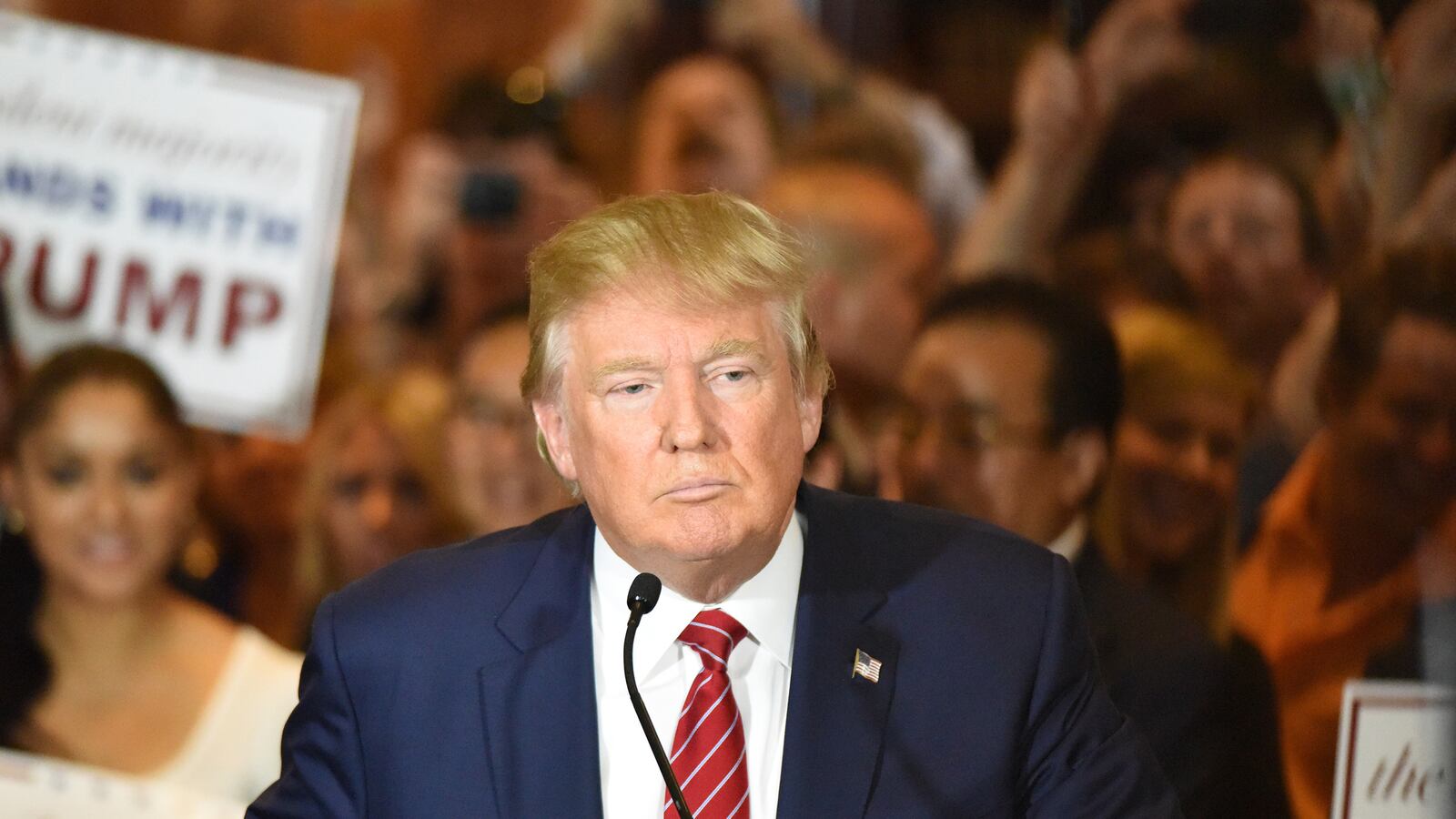Since the dawn of the Tea Party, Republican leadership in Washington has been playing a game of sorts—a game that Donald Trump threatens directly, in ways Capitol Hill Republicans do not yet understand.
The growling from Hill staffers about the Trump phenomenon lays the blame overwhelmingly at the feet of the typical cast of characters—“conservative jihadists” is a term not uncommonly deployed—who have irritated them so over the course of the past several years. These Republican staffers truly believe that they are having a phenomenally successful year on Capitol Hill—passing appropriations, a trade promotion authority, the No Child Left Behind reauthorization, and the like.
They see a new enemy and presume it is their old enemy. They’re used to blaming outside conservative groups for all sorts of extreme activity designed to push the government toward gridlock and shutdown, and they are inclined to view the Trump phenomenon as being part and parcel of the whole thing.
What these staffers do not realize is that they should be wishing this Trump phenomenon stemmed from the conservative base. If it was, it could be synthesized, negotiated with—the advocates for their agenda could be coddled or compromised, their priorities placed in the list of bullet points.
The problem is that this Trump phenomenon, while encompassing some of the Republican base, is not a creature of it, or in any way a structured objection to specific policies like, say, renewal of the Export Import bank.
Instead, it is an organic and anti-establishment response uninterested in negotiation. It is a revolt that seeks nothing less that the annihilation of the party’s ruling elite—and, perhaps, the Republican coalition along with it.
The Tea Party rabble, organized into its second-stage groups, actually functioned as a Faraday Cage for Republican leadership. They allowed for a lot of lightning and static, but nothing that would actually seek the outright destruction of their coalition—because, at the end of the day, they were still Republicans who would pull the lever for Mitt Romney. They were ideologically consistent, and therefore could be negotiated with. A trade here and there, a show vote for this or that, and they would fall in line.
Trump’s backers are something different entirely. They are post-Tea Party and post-Obama and post-two Supreme Court rulings that convinced them the game was more rigged than they ever believed. Trump represents a vibrant and fed-up mass of people who see the Republican Party as standing for nothing, so they have turned to someone who can beat the party by standing for anything.
So here we are: A basically non-ideological populist nativist nationalist reality TV star with zero political experience, running the most aggressively and comprehensively anti-establishment and anti-elite campaign in generations, is the undisputed leader of the GOP presidential primary.
Why is that? What do Republican leaders really think is happening out there? Do they really believe none of this matters? Do they really believe Trump is merely another creation of Conservatism, Inc.—the outside groups, talk radio, Fox News, and all the other anti-establishment holdouts that exist to pull the party further to the right? Do they really look at him and see the Rorschach blot of the same foes they have tussled with in the past—those intransigent conservatives who will not let them govern?
The poll data tells us otherwise. The top issues for the Iowa voters who have given Trump such a boost are two things that have been low on the agenda for the Tea Party and its organized components: immigration and trade. Trump is given the highest mark of any issue by likely Iowa voters (88 percent) on his “Buy American or not at all” trade position, one that is foreign to the vast majority of the conservative community and is entirely dismissed by GOP leadership.
Here, as with immigration, the expression of views by those who back Trump has less in common with the libertarian-leaning Tea Party fiscal conservatives and more in common with the populist protectionists of the past. It's an interesting thought experiment to consider the possibility that if the Pat Buchanan of 1996 was in today’s field in lieu of Trump, he might be performing just as well if not better—he’d likely be cornering the social conservatives, too.
Trump is playing to an audience of people who think of themselves less as Republicans and more as Americans—moderates, conservatives, and independents—who feel that the Republican Party has completely ignored their priorities and beliefs, and insulted them along the way.
It is a minority of the electorate, but it is a loud minority. Protectionism might rile up these Iowans, but its popularity is actually at historic lows. Polling indicates that only about 20-25 percent of the country favors mass deportation—but it is a 20-25 percent that has been ignored by both parties. These views have been espoused long before Obama, long before the Tea Party, by people on the right and the left. But they have been rejected by the elite, because such positions do not make for general election victories.
But Trump is not mounting a strong national message for building a general election coalition, nor does he care about the accuracy of his critique of immigration or the real ramifications of his trade policy. But he does represent a middle finger to the leadership of the Republican Party, a leadership that continues to ignore or insult the perspective of these voters, and the people are not demanding more of him than that raised digit held aloft.
And this gets at the existential threat Trump poses to the GOP elite: You can’t triangulate against a Sun Eater, or demand to hear its legislative endgame. You can only watch as it eats the sun.
The Republican leadership, by pretending this is just part of the same anti-governing sideshow, also ignores the idea that the Trump phenomenon might just have something to do with the way they are running Congress.
The congressional agenda in September—whether intended by leadership as such—will be the Republican political elite’s “response” to Trump. And what is that response likely to be? To move ahead with an Iran deal they cannot block, a continuing resolution, a highway bill? That is a response that says the Republican Party has decided the Trump phenomenon is not worth addressing, that they do not need or want his disaffected, frustrated voters in their coalition.
Republican leadership seem to be of the opinion that since Donald Trump will never be their nominee, they do not need to worry about any of this. The party’s high command is operating under the assumption that this Trump thing is nothing more than another silly “9-9-9” redux flare up, fabricated by “outside groups,” as they confidently whistle past the graveyard and smirk at suggestions the party as we know it could dissolve.
They have not yet noticed there is no Faraday Cage here—and the lightning is coming for them.





